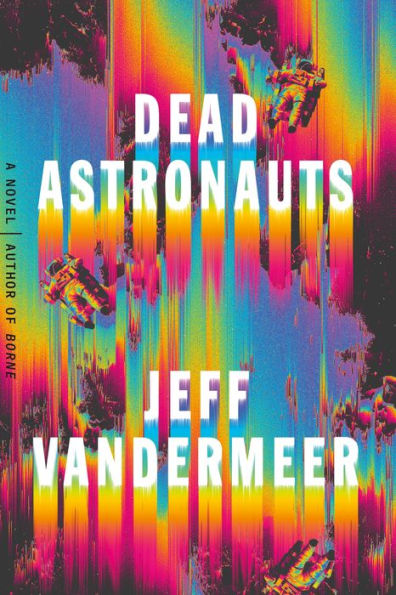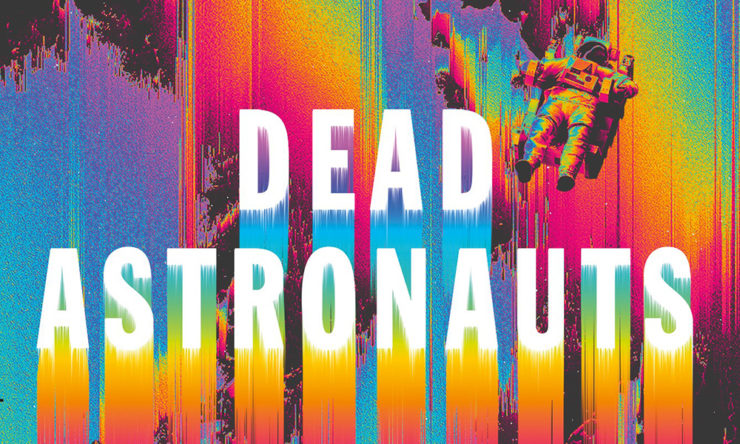There shall come three humans across the burning sands… Into the City, hoping to take down the Company, arrive three dead-alive people: Moss, Chen, and Grayson. A triad in all senses of the word, they repeat the same tasks over and over in different timelines or realities toward different outcomes—hoping, eventually, to find the right combination and destroy the Company entirely. However, these three aren’t the only ones involved in constructing potential futures, as there are foxes, and sea-monsters, and other creatures huge and small as well. The human clock has ticked to a near-stop; what comes next?
While Dead Astronauts is a companion novel to Borne—returning to the three titular dead astronauts at the city crossroads—it functions as a standalone text. There are calls to narrative moments in the other book, and images certainly, but it’s entirely possible to read as a cohesive work all on its own (so that’s what I intend to do, here). Themes and questions familiar to other novels by VanderMeer are present in this book as well: animality, technology, destructive human hubris, and an unimaginable but possible future of melding-merging-evolution that connects them all in a sometimes ugly, sometimes breathtaking dance.
[Some spoilers.]
It feels almost lazy, at this stage of the game, to toss out the word ‘hallucinatory’ for a Jeff VanderMeer novel—and yet it’s often the right word, particularly for sections of Dead Astronauts. The novel is a sort of functional archive: a novella of “the three” versus the Company, a set of prose poems from the perspective of the Behemoth or the Leviathan, another novella-screed from the perspective of an altered space-and-time-leaping fox enacting human tortures (catch-and-release banding, fur trapping, and so on) back onto them, and so on. As the book builds it also dissolves, dispersing into an ever-circling, ever-widening set of images and themes that all lock into a strange web of relational connections—the City, the Company, the morass that is naturecultural (to steal a Donna Haraway phrase) interpenetration.
Dead Astronauts is not what I would call a simple read. It’s quite purposefully challenging, in the way that complex flavors are “challenging.” It twists the mouth, a little, but it also feels good; it feels unexpected yet expected. I suspect reader responses to the dispersed ending and the dissolved narrative arc, without clear success or failure or even definitions of what those might mean in context, will be all over the map. However, I’ll point out that I don’t think linear narrative is the point. That’s tricky, as the first third of the book is a cohesive narrative, and the dissolution and reconstitution of Moss (with Grayson and Chen orbiting) is a constant throughline in the text, but overall the function of the novel isn’t traditionally structural.
What it is, is affective. There’s a reason half of the book relies on poetic structure rather than narrative, and that’s emotion and animality. A line in the first third reads, “For that was what bodies wanted: To come to rest. To know no more.” And another, later on: “The body did not exist separate from the soul because the soul didn’t exist. But the future never left the past behind either.” To whip out my academic hat for a moment—this is the project of much affect studies work and, connected to that, animal studies too: to unite ontology (regarding being) and epistemology (regarding knowing), reconnecting or dissolving false binaries of the thinking mind and the feeling body that place the human-being outside the web of the world and our own bodies.
VanderMeer is doing that, here, narratively and poetically—showing the falsity of the separation and the deep, physical, real experience of the flesh. Our titular dead astronauts are, in the first third, a time-repeating triad whose love for each other transcends and descends into the bodily. They share emotions and thoughts through the dispersed system that is Moss, though she takes a human shape; they fuck, they cuddle, they feel together, they seek as one unit. There’s also the unity of the foxes and constant gestures to the forest-mind and mycological networks under the soil and the electromagnetic veins that pulse through the earth.
The apocalypse is twofold: a human apocalypse that has devastated the natural world, driven by greed and hubris and technological cancer, but… as the final section of the book argues, it’s not necessarily the end of the world, just the end of humanity. That’s only an end for some. For others, and for other animals, it might be a fresh start. VanderMeer is doing sf as it’s meant to be done, writing public critical work through story, thinking about our current moment through a future possibility. In a section revolving around the man who helped ruin it all, he writes, “It had become a death cult, under a veneer of what was inevitable and necessary, and anything else was illogical.”
Buy the Book


Dead Astronauts
Sound familiar? Anyone with a passing familiarity to idea of necropolitics, or the fact that our technological development rests on colonial exploitation and a failure to think about ethics (just because you can, should you) under the heading of “progress,” sees what he’s doing with that section. While Dead Astronauts is extreme, occasionally becoming a nightmare that crosses the limits of imagination and hallucination, it’s also deeply rooted in the now. Each section of the text offers an illustration, an argument, that connects to the whole: from Sarah the homeless woman’s relationship to the salamander, to Charlie X’s abuse and abuse of the world, to the fox, to the leviathan—each section connects to a greater whole, to the moment where Grayson and (a) Moss/Sarah are united at the tidal pools, across the seven realities.
Ultimately, it’s hard to make a concrete statement of conclusion, what happens and what it means. The Company and the City across their various instantiations continue on and continue dissolving, pumping out destructive biotechnologies past human interventions—victory, for what it’s worth, seems to be ill-defined and not graspable at this time. (Of course, this is also a companion novel to Borne, but let’s keep considering it on its own steam here.) The three corpses are in one time dead and in another alive, in one together and another separated, and throughout it all the fox roams and Charlie X spills poison from the factories that eventually expel him. The darkness of inevitability is balanced with the hard question of what failure is—for humans, perhaps extinction, but what’s left without us?
A world, still. But perhaps we should strive not to get there.
Dead Astronauts is available from Farrar, Straus & Giroux.
Read an excerpt here.
Lee Mandelo is a writer, critic, and editor whose primary fields of interest are speculative fiction and queer literature, especially when the two coincide. They have two books out, Beyond Binary: Genderqueer and Sexually Fluid Speculative Fiction and We Wuz Pushed: On Joanna Russ and Radical Truth-telling, and in the past have edited for publications like Strange Horizons Magazine. Other work has been featured in magazines such as Stone Telling, Clarkesworld, Apex, and Ideomancer.










